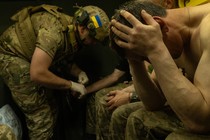The Most Effective Antidote to ISIS Attacks
4 min read
The man who murdered at least 15 people with his truck on Bourbon Street last night was flying the black banner of the Islamic State from his truck, according to the FBI. Police shot 42-year-old Shamsud-Din Bahar Jabbar dead at the scene. So far little else is known about the suspect, but since ISIS flags are not standard options in Ford F-150s, it is reasonable to presume that the driver—a U.S. Army veteran—committed mass murder as an homage to the Islamic State.
President-elect Donald Trump famously lamented that Mexico was “not sending their best” to the United States. After contempt for the New Orleans killer, and sadness for the dead and 35 wounded, my reaction to this attack is relief that for the last decade, the Islamic State has been sending its best, and its best remain verminous incompetents whose most ingenious plots involve driving trucks into crowds. Jabbar is said to have brought along explosives, and to have set his Airbnb on fire, but his bombs either didn’t work, or he did not live long enough to set them off. In 2014, the Islamic State regarded its string of early victories as a sign that God favored it. By now I wonder if it has noticed that God has seemingly capped the IQs of its operatives, and taken the hint about what that might say about its continued divine favor.
In 2014, the group’s spokesman, Abu Muhammad al-Adnani, kicked off its campaign of terror in Europe by urging followers to improvise weapons. “If you are not able to find an IED or a bullet,” he said, “smash the American or European’s head with a rock, or slaughter him with a knife, or run him over with your car.” Some horrific attacks ensued, including a truck ramming in 2016 that killed 86. But consider the number of Islamic State supporters of European origin—probably in the tens of thousands—and the easy availability of rocks, knives, and cars. Few have taken Adnani up on his offer, and those who have, tend to be (if the jihadists will pardon the expression) ham-handed.
I am not always so optimistic. Every successful attack is tragic. Plots by patient, methodical, and capable people do occur from time to time, and when they are disrupted in their early stages, the details are sobering reminders of what could happen. Indeed, just this week, the FBI detailed what it described as the largest homemade-explosives cache it had ever discovered, in the hands of a 36-year-old man in Smithfield, Virginia. Those hands were allegedly mangled by a homemade bomb a few years ago (“several fingers were missing”), and a neighbor alerted authorities that the suspect was “stockpiling weapons and homemade ammunition.” It is difficult to overstate how much weaponry one must stockpile before Virginians begin to wonder whether the stockpile might be a tad excessive and merit the attention of the Bureau of Alcohol, Tobacco, and Firearms (all three of which have near-sacramental status in the rural parts of the commonwealth). The suspect is not an ISIS supporter, but he reportedly shows signs of other dubious extreme views. Prosecutors said they found a bag of pipe bombs, and the bag had a “#NoLivesMatter” patch. The suspect was released on Monday into his mother’s custody.
The nightmare scenario is, and has always been, the combination of violent motivation with the patience and planning that would allow that motivation to find maximally lethal expression. Idiots can still kill, and murders perpetrated by them are as devastating as any other. The mass murder early this morning, long after the Islamic State lost its territory and ceased to be a source of daily terror, shows that that threat is limited in magnitude but nonetheless eternal. Senator Josh Hawley, a Republican from Missouri, called for a hearing on the attack and alleged that “the Biden Administration has made [Americans] less safe,” through unspecified negligence. But no public information so far suggests that authorities could have stopped the killer from renting a truck and driving it into a crowd. The most effective antidote to attacks like this is probably just to do what the United States did late in Obama’s second term and throughout Trump’s first: to dismantle the Islamic State and relegate it to obscurity, where it has less power to inspire random people from acting in its name. That strategy has the added effect of countering more sophisticated attacks, since it leaves attackers with fewer lairs and safe havens from which to stage them.
There is no law of nature that says terrorists must always be bad at terrorism. Many terrorists and mass murderers have plotted very effectively, and racked up the body counts to prove it. Right now, authorities are investigating whether the New Orleans killer had accomplices. If he did have help, then his accomplices were equally incompetent. The correct response, in the long term, is to prepare for the day when competence and fervor intersect. Mercifully, that day was not today.
In the shorter term, I agree with my colleague Juliette Kayyem: the correct response to this crime is to proceed with life, play football, and let New Orleans begin to heal itself. No American city feels as alive as New Orleans, as incapable of being deterred from partying. The city has its homegrown poets, but I am partial to the Englishman Philip Larkin’s lines about New Orleans: “On me your voice falls as they say love should / Like an enormous yes… the natural noise of good, / Scattering long-haired grief and scored pity.”



